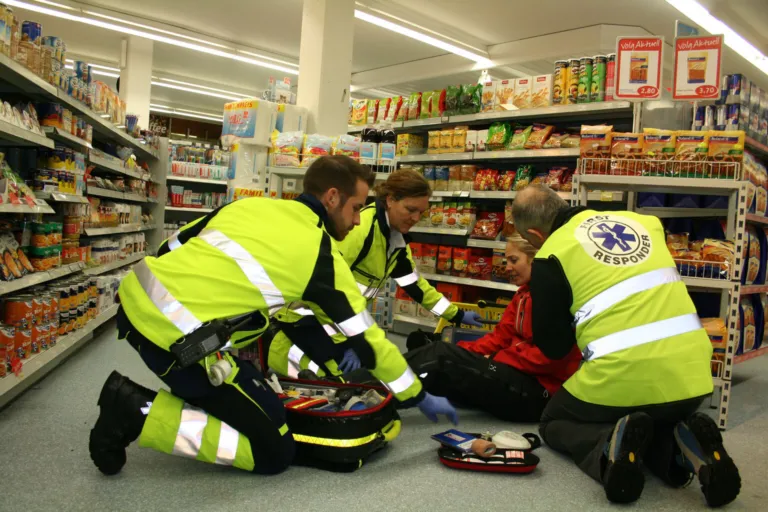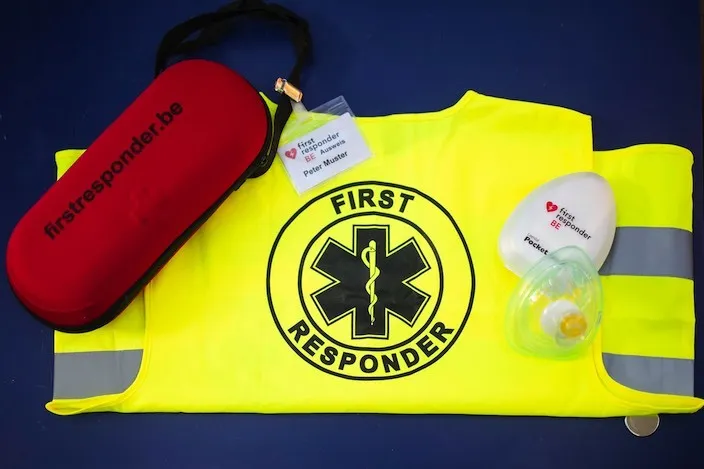Association firstresponder.be concludes exclusive partnership with resQshock. Together against sudden cardiac death.
Firstresponder faster than the paramedics
In the case of heart failure, minutes, even seconds, decide between life and death. Often the ambulance arrives too late. That is why several cantons are currently setting up a network of volunteer lifesavers. They rely on the medical knowledge of farmers, housewives and teachers. Meeting one of these "first responders".
What are first responders?
The English term First Responder has become established in German-speaking countries as a technical term for "Ersteintreffender" (first responder). The first responders (FR) can be alerted outside the regular rescue service via the cantonal app and offer a form of coordinated first aid, which bridges the time interval with medical emergency patients until the arrival of a rescue vehicle, with simple first measures.
The FR's area of responsibility extends to:
- LESOMA (life-saving immediate measures, e.g. positioning, haemostasis)
- Using BLS / AED
- Caring for patients and relatives
- Briefing rescue vehicles
- Mission protocol / report to rescue service
- Assisting and supporting the rescue service (medical measures and rescue)
In addition to the numerous First Responders, around 45 so-called Rapid Responders are now on standby throughout the canton. Rapid responders are paramedics or other professionals who work in a cantonal rescue service and are privately equipped with a fully medically equipped rescue backpack. Like first responders, they go out voluntarily in their free time and can bridge the time until the rescue service arrives at the scene and, if necessary, already carry out medical measures (administer infusions and medication, oxygen, etc.).
Why First Responders?
In Switzerland, up to 8,000 people suffer a cardiovascular arrest every year. In over 80% of these patients, the heart is in so-called ventricular fibrillation (unnatural, insufficient heart activity) in the first few minutes after the event, which can be treated by early defibrillation with often good results.
Good results can only be achieved with a sufficient chain of survival. This consists of a rapid sequence of early patient contact, early start of cardiopulmonary resuscitation (Basic Life Support BLS / CPR), timely defibrillation and early professional resuscitation (Advanced Cardiac Life Support ACLS) (Bernhard, C.; 2006).
In fact, however, on average only 5% of patients in Switzerland have survived a cardiovascular arrest in recent years.
In addition to chest compressions (cardiac massage) and ventilation, early defibrillation with an AED device is one of the most important cornerstones of successful resuscitation. AED devices are lay defibrillators and can therefore be operated by anyone.
The geographical distribution of the population, the locations of the rescue service bases as well as the topography of the region are factors for the fact that not every emergency site can be reached equally quickly. The average journey time to a scene for urgent operations takes around 13 minutes across the whole of the canton of Bern. This means that not all patients can be reached by the ambulance service within the critical period of 3 - 5 minutes after the onset of a cardiovascular arrest. However, this should be strived for, as the chance of survival decreases by up to 10% with every minute lost.
The rapid alerting of the professional rescue services (emergency number 144) as well as resuscitation measures that are started immediately and continued without interruption (rescue chain) are decisive for survival.
In the last 10 years, first responders have become established in Switzerland and in many European countries and are an integral part of the rescue chain in many places. In the canton of Bern, more than 2,500 first responders are already active. The helpers involved come from a wide variety of organisations and regions. The heads of the regional rescue services of the Canton of Berne have drawn up a cantonal first responder concept by means of a working group and put it into effect. All first responders in the canton of Berne are trained and further trained according to this concept by means of introductory training and further training courses. This ensures that all first responders meet the same requirements and are well equipped for their mission as first responders.
Would you like to find out more? Simply call us on 055 460 22 44

